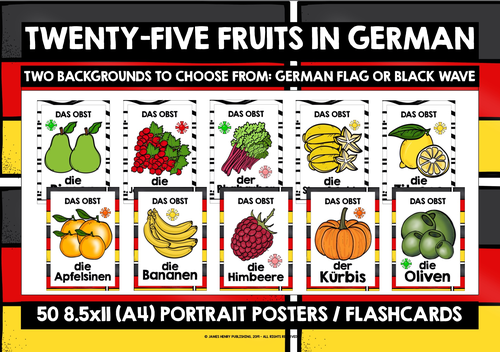







PRIMGERMAN FRUITS & VEGETABLES FLASHCARDS POSTERS two sets of flashcards @ $1.80 each in the bundle Das Obst und Gemüse auf Deutsch 25 fruits & 25 vegetables in German, definite article, masculine & feminine, singular & plural. Using flashcards to introduce and practice language is a popular and successful language teaching and learning method, providing lots of opportunity for vocabulary games and recall. The flashcards are equally useful as classroom posters, keeping key target language prominent and visible, as well as creating a really German ambiance in the learning environment. I use this set to gradually introduce and work on the concept of gender, and to provide speaking and pronunciation prompts, from the straightforward Was ist das? to Ja/nein or Richtig/falsch questions, which allow us to move to from one-word responses to more complex language, such as plurals or particularly negative sentences, which can be quite tricky in German, and often requires a lot of practice Nein, das ist kein Apfel, das ist eine Banane and so on. This kind of vocabulary is really useful for an implicit approach to introducing and practicing the accusative of articles too, for example Ich habe einen Blumenkohol, Ich habe den Blumenkohl.
The key focus on on the definite article, both masculine and feminine, singular and plural, though I do use the set to start to compare these with the indefinite article, which I’ve found to be a really successful way of helping students embed grammatical concepts such as gender, implicitly, without the need for repeated explicit instruction. It’s good to move away from predominantly teacher-led activities, and after the initial introduction phase, I have students take turns manipulating the cards and asking the questions. Again, this is a really popular activity, and a very easy way of enabling students to practise asking questions, instead of always responding to them.
The fruits are: green apples; red apple; bananas; cherries;
dates; fig; green grapes; red grapes; kiwi; lemon; mango;
nectarine; olives; oranges; papaya; peach; pears; pineapple;
pumpkin; raspberry; redcurrants; rhubarb; starfruit;
strawberries; watermelon
The vegetables are: artichoke; asparagus; beetroot;
broccoli; cabbage; carrots; cauliflower; celery; corn; cucumber;
eggplants/aubergines; French/green beans; garlic; leeks; lettuce; mushrooms; onions; peas; red peppers; yellow pepper;
potatoes; sprouts; spinach; sweet potatoes; tomato
The posters are 8.5 x 11 (A4) portrait size. There are two backgrounds to choose from - German flag or black wave, so 100 posters in total. The fruits and vegetables are in my store separately, at £3.00 each. The files are non-editable in a zipped format. They’re copyright, all rights reserved. They may not be copied, rewritten, shared or distributed in any way. The license for purchase is a single-user license only. Please read the Terms of Use.
VIELEN DANK UND GUTEN APPETIT!
Something went wrong, please try again later.
Great posters!
Report this resourceto let us know if it violates our terms and conditions.
Our customer service team will review your report and will be in touch.